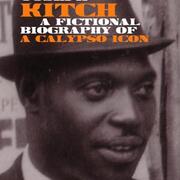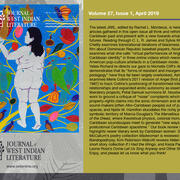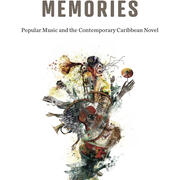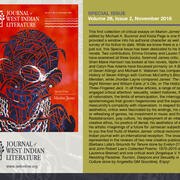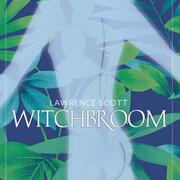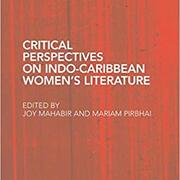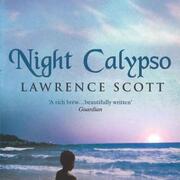Hamilton, Njelle. ““‘Another Shape to Time’: Tentacle’s Spiral Now"”. Sx Salon, no. 34, 2020.
Scholarship
2020
Hamilton, Njelle. “‘Rita Indiana’s Tentacle: An Introduction’”. Sx Salon, no. 34, 2020.
2019
Hamilton, Njelle W. “‘Portrait of the Calypsonian As a Young Man: Review of Anthony Joseph’s Kitch: A Fictional Biography of a Calypso Icon. (Peepal Tree: 2018).’”. SX Salon, no. 31, 2019.
When Trinidadian-born poet, musician, and novelist Anthony Joseph set the publication date of his second novel to coincide with the seventieth anniversary of the arrival of the Empire Windrush at Tilbury, he could not have foreseen the 2018 scandal that rocked Britain and the Caribbean diaspora. British citizens, by virtue of both birth under empire and the 1948 British Nationality Act, were stripped of citizenship rights and deported from the home and society they had helped build for more than half a century. There is perhaps no other Caribbean individual so suited to encapsulate the Windrush generation than calypsonian Lord Kitchener, especially given the iconic images of his disembarking on 22 June 1948 and singing the now infamous strains of “London Is the Place for Me” into the microphone of a Pathé journalist. These scenes appear a third of the way into Kitch: A Fictional Biography of a Calypso Icon, but they telegraph the salient questions of belonging that the novel probes and the social and historical record that Trinidadian calypso creates in song.
Hamilton, Njelle W. “‘Jamaican String Theory: Quantum Sounds and Postcolonial Spacetime in Marcia Douglas’s The Marvellous Equations of the Dread.’”. Journal of West Indian Literature., vol. 27, no. 1, 2019, pp. 88-105.
This essay examines the politics, poetics and physics of technologies of time in The Marvellous Equations of the Dread. I trace how its dysfunctional clock tower, an interdimensional portal, marks unstable spacetime and mimics the disorientation ushered in by colonial epistemologies that violently displace the archives of Jamaican memory. To recover Jamaican temporalities, Douglas draws inspiration from the quantum mechanics of dub’s echo effects and crafts a Jamaican version of a theoretical model in physics called ‘string theory.’ In the novel’s version, tree roots, Rastafari locs and guitar strings amplify the subterranean vibrations of black pain on the clock tower site. These infrasonic disturbances destabilize clock time and give rise to alternate forms of memory, narration and motion—including time travel and teleportation. I argue, therefore, that the way that sounds move in the novel gets to the heart of profound questions about the nature of Caribbean space and time.
Hamilton, Njelle W. Phonographic Memories: Popular Music and the Contemporary Caribbean Novel. Rutgers University Press, 2019.
Phonographic Memories is the first book to perform a sustained analysis of the narrative and thematic influence of Caribbean popular music on the Caribbean novel. Tracing a region-wide attention to the deep connections between music and memory in the work of Lawrence Scott, Oscar Hijuelos, Colin Channer, Daniel Maximin, and Ramabai Espinet, Njelle Hamilton tunes in to each novel’s soundtrack while considering the broader listening cultures that sustain collective memory and situate Caribbean subjects in specific localities. These “musical fictions” depict Caribbean people turning to calypso, bolero, reggae, gwoka, and dub to record, retrieve, and replay personal and cultural memories. Offering a fresh perspective on musical nationalism and nostalgic memory in the era of globalization, Phonographic Memories affirms the continued importance of Caribbean music in providing contemporary novelists ethical narrative models for sounding marginalized memories and voices.
2018
Hamilton, Njelle W. “‘‘Jah Live’: Messianic Time and Post-Traumatic Narrative Disorder in Marlon James’s A Brief History of Seven Killings.’”. Journal of West Indian Literature., vol. 26, no. 2, 2018, pp. 80-95.
This essay unpacks the time markers in Marlon James’s A Brief History of Seven Killings to interrogate the impact of trauma on the perception and narration of time. Drawing parallels with the Christian Messiah and extending the trope of eternal life in Bob Marley’s song, “Jah Live,” I examine the novel’s depiction of what I call ‘post-traumatic narrative disorder,’ a novelistic rendering of PTSD .In the song and the gospels alike, narrators posit eternal life to negotiate the sudden death of a messianic figure and its consequences for their own life and death. Correspondingly, I trace the relative clock-speeds in the narratives of two sets of James’s characters—the dead who narrate eternity in an instant, and the living who are anticipating death—to show how the trauma of death disorders and dilates the subject’s experience of time. I argue that the phrase “Jah Live” indexes a messianic and post-traumatic conception of time where the “at-hand,” the “now,” and the “already” collapse into an extended and disordered narrative instant.
2017
Hamilton, Njelle W. “‘On Memory and the Archives of History: A Conversation With Lawrence Scott.’”. Wasafiri Magazine, 2017.
Lawrence Scott is the acclaimed author of four novels—Witchbroom (1992), Aelred’s Sin (1998), Night Calypso (2004), and Light Falling on Bamboo (2012). He has also published two story collections, Ballad For The New World (1994) and Leaving By Plane Swimming Back Underwater (2015). He is the editor of Golconda: Our Voices Our Lives (2009), an oral history of life on a sugarcane estate in Trinidad. Born into a French and German Trinidadian family on a sugar estate in southern Trinidad, in 1963 Scott left the island for England to pursue a vocation as a Benedictine monk. He found his true calling as a Caribbean writer, however, upon returning to Port of Spain as a teacher in the late 1970s. Each of his novels has been short-listed for the Commonwealth Writers’ Prize, which Aelred’s Sin won (Best Book in the Caribbean and Canada) in 1999. It was also long-listed for the Whitbread and Booker Prizes in 1999. The following edited conversation took place between October 2016 and January 2017. This year marks the twenty-fifth anniversary of the publication of Witchbroom, with an anniversary edition forthcoming from Papillote Press in April 2017.
2013
Hamilton, Njelle W. “"’Music and a Story’: Sound Writing in Ramabai Espinet’s The Swinging Bridge”. Critical Perspectives on Indo-Caribbean Women’s Literature., Routledge, 2013, pp. 70-92.
Throughout her oeuvre, Ramabai Espinet, Indo-Trinidadian Canadian poet, scholar and novelist, has made clear her longstanding concerns with the erasure of Indo- Caribbean women in the literature, culture, and politics of the region. Her 2003 novel The Swinging Bridge is a clear contestation of that erasure, in its almost manifesto-like voicing of the Indo-Trinidadian female experience. In this essay, I examine the ways in which the novel’s narrator, Mona’s placelessness is signaled by her relationship to the sounds, rhythms and cultural influences that form both the novel’s soundscape, and the soundtrack of her life: Canadian Presbyterian hymns, calypso (kaiso) music, and Indo-Trinidadian folk songs. The novel critiques the politics of these musical genres that operate as repositories of problematic colonial, national and patriarchal ideologies, and contrasts them with the chutney songs that Mona finds recorded in her grandmother’s journal. I argue, therefore, in its investment in recuperating and validating alternate types of records, both musical and written, the novel works to sound out the previously silenced testimonies of Indo-Trinidadian women.
Hamilton, Njelle W. “‘‘From Silent Wounds to Narrated Words’: Calypso Storytelling in Lawrence Scott’s Night Calypso.’”. Anthurium: A Caribbean Studies Journal, no. 10, 2013, p. art. 3.
In this article, I examine Night Calypso’s depiction of the relationship between trauma and calypso narrative, particularly, the ways in which the music form is constructed in the novel as an apt narrative mode for traumatized and wounded peoples. I argue that the novel proposes calypso storytelling, with its linguistic and formal displacements, reenactments and masquerades, as a means by which traumatized postcolonial peoples wrest agency over their past, present and future.

